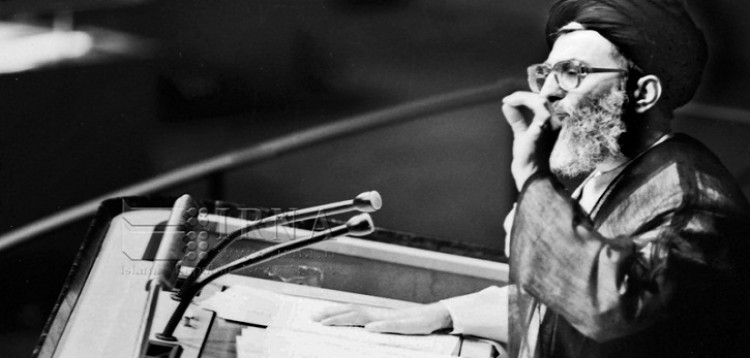
UK admits US humiliated by Ayatollah Khamenei in UN

UK Secretary of Foreign and Commonwealth
Affairs Sir Geoffrey Howe called Ayatollah Khamenei’s speech to the UN
General Assembly which addressed the political and media barrage of the
United States and its military support of Iraq an agitation and
humiliation of the West all through. Joe Clark, Canada Foreign Minister,
called it "devastating”.
Ayatollah
Khamenei’s speech was delivered in the most critical years of the
imposed war, during a time when a large campaign led by the United
States was directed at the Islamic republic. Nonstop support behind the
Saddam regime continued after Resolution 598 and there was a heavy media
barrage against the Islamic Republic in Western media.
On the military front, nevertheless, the war on tankers had peaked and the United States had on agenda to attack Iranian commercial ships and stand totally behind the Saddam regime, despite the fact that it had used chemical weapons against civilians in Iran. It was against such current that decision was made for the Iranian president to speak before the UN General Assembly where logical critique by Ayatollah Khamenei came as a decisive response to US actions.
In September 21, 1988, then president Ayatollah Ali Khamenei left Tehran for New York to attend the assembly. This was taking place seven years after a previous president, Mohammad Ali Rajaei, had last made the trip.
At that time, Western powers and the regional allies of Saddam thought that the Islamic Republic is under pressure and is ready to accept their conditions completely. To the contrary, with the victories of Iran against the Saddam Regime, it was the Western countries that had failed most.
This had made Western countries boost their campaign against Iran. The issuance of Resolution 598 and all-out efforts to pressurize Iran were among the actions taken toward that aim. These came despite the fact that all the crimes committed by the regime of Saddam had been overlooked in the resolution. Also, Western powers had vented a vast military and economic siege on Iran and had engaged in direct and indirect military actions against the Islamic Republic in a totally new front, making Iraq bolder in its crimes such as attacking Iranian cities with chemical bombs.
Lashing out at Western countries biased approach and their support for Iraq, Iran would make strong criticism of the United Nations and had in practice let go of the UN tribune. At such time, Ayatollah Khamenei was decided to take the stage as an effort to tackle the situation. Ayatollah Khamenei’s well-documented and outspoken speech found great reverberation among the guests and consequently through world media and enraged the United States and Western powers which had a hand in the situations.
He started his speech before the UN General assembly and many states which were at odds with the Islamic Republic by: "God Alimighty, I begin in your name and I ask for your guidance and help. My life, death, need, and prayers are for you. Give my words the light and penetration of the right word.”
The then Iranian president was criticized for delivering a logical and well-structured defense, illumination the world of United States crimes in the Persian Gulf, stressing the injustice that had been directed at Iran during the war, speaking about the inability of the Security Council in meeting such crimes.
Ayatollah Khamenei exposed the silence, but rather the covert and overt help of Western powers to Saddam. He said "Iran expected the Security Council at least to remain unbiased.”
Ayatollah Khamenei made analogy between Saddam and German dictator Adolf Hitler and asked for using the experience of the Court of Nuremberg trials and called for a punishment of Iraq as a trespasser to help secure the region. He said United Nations Security Council’s inability in condemning Saddam’s acts of waging war on cities, launching chemical attacks, and the initiation of the war was responsible for the inimical positions adopted by many countries including the United States.
This is not just a critique of the Security Council, but a critique of the performance of the United Nations and a remembrance of the Security Council’s role in supporting the Iraqi invasion of the Iranian soil. It was something that the world let unheard and showed up later on in the Iraqi invasion of Kuwait.
Of Ayatollah Khamenei’s most unprecedented attacks was his critique of the Security Council structure and that of the UN. He called the right to veto and the permanent membership of the Security Council two examples of discrimination at the UN. Condemning the outright interference of the Security Council in the imposed war, Ayatollah Khamenei said the structure of the lofty palace raised with the Security Council policies is no more than a gaudy mansion made of cardboard.
The issue of Israel was another part of Ayatollah Khamenei’s speech, where he said the fake Zionist regime stood side-by-side the fascist regime of South Africa, which at that time used to yield harsh racist laws.
Another axis of the Iranian president’s speech concerned counting actions by the United States against the Islamic Republic, as well as calling for integrity among developing countries to fight the hegemonic system.
Ayatollah Khamenei also stressed cultural issues and urged a campaign against corruption, taking actions to preserve the family, and efforts to honor and redeem the rights and values of women.
Another important and well-planned part of Ayatollah Khamenei’s speech was threatening the United States with retaliatory actions against the country’s attacks on Iranian commercial ship which had been carried out under the pretext of fighting mining at the Persian Gulf.
The intrepid, daring speech by the Iranian president at that time came at a time when Western countries and the supporters of Iraq were thinking that they had put Iran under pressure. But Ayatollah Khamenei’s positions drew a wave of appreciation from Iranian officials and made the Iranian nation and added much to the morale of Iranian soldiers at the war front.



